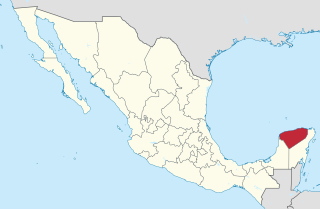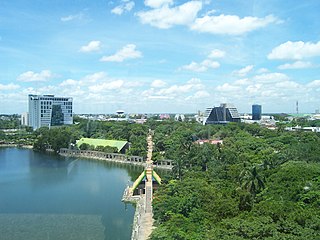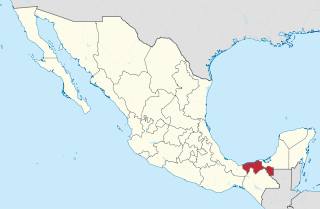
Tabasco sauce is a brand of hot sauce made exclusively from tabasco peppers, vinegar, and salt. It is produced by McIlhenny Company of Avery Island, Louisiana.

The Nineteenth Amendment to the United States Constitution prohibits the states and the federal government from denying the right to vote to citizens of the United States on the basis of sex. The amendment was adopted on August 18, 1920 as the culmination of the women's suffrage movement in the United States, which fought at both state and national levels to achieve the vote. It effectively overruled Minor v. Happersett (1875), in which a unanimous Supreme Court ruled that the Fourteenth Amendment did not give women the right to vote. Since the 1860s, an increasing number of states had given women the right to vote, but several states still denied women the right to vote at the time the amendment was ratified.

Yucatán, officially the Free and Sovereign State of Yucatán, is one of the 31 states which, with Mexico City, comprise the 32 Federal Entities of Mexico. It is divided in 106 municipalities, and its capital city is Mérida.

Villahermosa is the capital and largest city of the Mexican state of Tabasco, and the municipal seat of the Centro municipality. Villahermosa reported a population of 658,524 in the 2005 census, whereas its Centro municipality had 558,524 inhabitants. The municipality covers an area of 1,612 km2. The city is 863 kilometres (536 mi) from Mexico City.

Tabasco is a state in Southeast Mexico that is divided into 17 municipalities.

The Second Battle of Tabasco, also known as the Battle of Villahermosa, was a battle fought in June 1847 during the Mexican–American War as part of the U.S. blockade of Mexican Gulf ports.
Yokotʼan (self-denomination), also known as Chontal Maya, is a Maya language of the Cholan family spoken by around 37 thousand Chontal Maya people of the Mexican state of Tabasco. According to the National Catalog of Indigenous Languages of Mexico-INALI, Yokotʼan has at least four dialects: Nacajuca (Central), Centla (Northern), Macuspana (Southern) and Tamulte (Eastern).

The tabasco pepper is a variety of chili pepper species Capsicum frutescens with its origins in Mexico. It is best known through its use in Tabasco sauce, followed by peppered vinegar.

Manuel Andrade Díaz is a Mexican politician affiliated with the Institutional Revolutionary Party (PRI) and former Governor of Tabasco. He holds a Law degree from the University Juárez Autónoma of Tabasco and qualified in Electoral Law and Parliamentary Law.
Enrique Priego Oropeza is a Mexican politician of the ruling Institutional Revolutionary Party and a former Acting Governor of Tabasco.

Tomás Garrido Canabal was a Mexican politician and revolutionary and atheist activist. Garrido Canabal served as dictator and governor of the state of Tabasco from 1920 to 1924 and again from 1931 to 1934, and was particularly noted for his Anti-Catholicism. During his term he fiercely persecuted the Church in his state, killing many priests and laymen and driving the remainder underground.
In Mexico, boroughs, into which some municipalities and Mexico City are divided for administrative purposes, are known as delegaciones. Boroughs can either be second-level semi-autonomous administrative divisions –as it is the case in the Mexico City– or third-level non-autonomous administrative divisions –as it is the case in all other municipalities that have implemented this particular territorial organization. The limits, nature and competencies of boroughs are usually described in the constitutions of the states they are part of, or in the laws enacted by the municipality itself, and may differ from municipality to municipality.
The modern history of anticlericalism has often been characterized by deep conflicts between the government and the Catholic Church, sometimes including outright persecution of Catholics in Mexico.

John Avery McIlhenny (1867–1942) was an American businessman, soldier, politician and public servant. He was the eldest son of Tabasco sauce inventor Edmund McIlhenny.

Pozol is the name of both fermented corn dough and the drink made from it, which has its origins in Pre-Columbian Mexico. Other ingredients besides corn dough and water, such as cocoa, may be added to it. The drink is consumed in the south of Mexico in the states of Chiapas and Tabasco. It is a thirst-quencher which has also been used to fight diseases. It has also aided indigenous peoples of the Americas as sustenance on long trips across the jungles.
Televisión Tabasqueña (TVT) is a state-owned public television network serving the Mexican state of Tabasco on three broadcast transmitters. The network is operated by CORAT, the Tabasco Radio and Television Commission, along with La Radio de Tabasco and Mega 94.9. TVT programming primarily consists of cultural and educational content.

The Centralist Republic of Mexico, or in the anglophone scholarship, the Central Republic, was officially the Mexican Republic. It was a unitary political regime established in Mexico on October 23, 1835, under a new constitution known as the Seven Laws after the repeal of the federalist Constitution of 1824. Mexican conservatives attributed the political chaos of the federal era to the empowerment of states over the federal government, participation of non-elite men in the political system through universal male suffrage, rebellions, and economic stagnation to the weakness of the federal government. Conservative elites saw the solution to the problem as abolishing the federal system and creating a centralized one, reminiscent of the colonial era. Federalism had given a range of powers to Mexican states, their legislatures and municipalities. It was favored by the states outside the center of Mexico. Those favoring a centralized state were the conservative urban elites. Mexican conservatives saw federalism as a failure and Mexico not prepared for such a system. They considered the ideal form of government as a centralized, administrative republic, with the states losing power to the central government. Conservatives with the support of the Mexican army created the Central Republic, which lasted eleven years, 1835–46. The unitary regime was formally established on December 30, 1836, with the enactment of the Siete Leyes. However, the Seven Laws proved unworkable and were abandoned four and a half years later, and replaced by a military dictatorship under Antonio López de Santa Anna. On August 22, 1846, acting President José Mariano Salas issued the decree that restored the Constitution of 1824 and, with this, the return to federalism.

Adán Augusto López Hernández is a Mexican politician affiliated with Morena.














